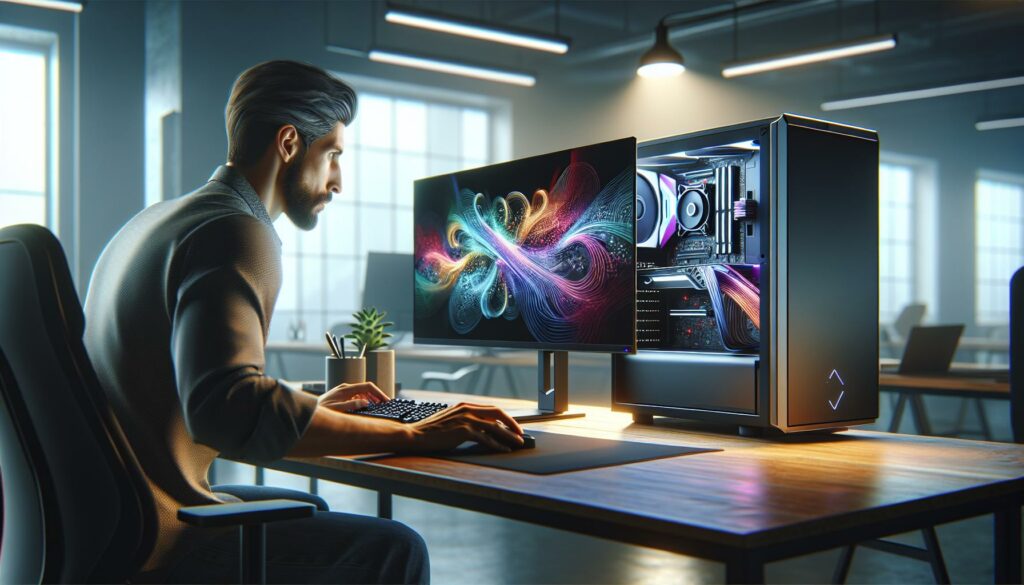”
I’ve helped countless people sell their old computers and know how challenging it can be to find reliable buyers in your local area. Whether you’re upgrading to a new system or simply clearing out unused tech, selling your used computer doesn’t have to be a hassle.
From big-box retailers to local repair shops and online marketplaces, there are several trustworthy options for selling your used computer nearby. I’ll guide you through the best places to get cash for your old desktop or laptop while ensuring you get a fair price. Plus, I’ll share insider tips on how to prepare your device for sale and maximize its value in today’s competitive market.
Key Takeaways
- Local computer repair shops and electronics retailers like Best Buy are reliable options for selling used computers, offering immediate payment and professional device evaluation
- Educational institutions and corporate buyers often purchase used computers in bulk, making them viable options for selling multiple devices
- Apple products typically retain 20-30% more value than comparable Windows devices, while systems with SSDs command 15-25% higher prices than HDD models
- Local sales eliminate shipping costs and offer same-day cash payments, though online marketplaces may provide 15-25% higher prices despite transaction fees
- Properly preparing your computer for sale by backing up data, performing a factory reset, and cleaning the device can significantly impact its resale value
- Documenting your computer’s specifications, maintenance history, and including original receipts can increase the selling price by 10-25%
Who Buys Used Computers Near Me
The used computer market operates through multiple channels with diverse buyer profiles. I’ve identified key market segments based on purchasing patterns and price sensitivity.
Common Types of Buyers
- Electronic Retailers: Best Buy Geek Squad accepts trade-ins for store credit or cash payments
- Local Computer Shops: Independent stores purchase used devices for refurbishment or parts
- Educational Institutions: Schools buy used computers in bulk for student programs
- Corporate Buyers: Companies acquire refurbished systems for office deployments
- Online Resellers: eBay merchants purchase used computers for online resale
- E-waste Recyclers: Professional recyclers buy non-functional units for parts recovery
| Computer Type | Age | Average Price Range |
|---|---|---|
| Gaming Desktop | 1-2 years | $400-800 |
| Business Laptop | 2-3 years | $200-400 |
| MacBook Pro | 1-3 years | $500-1200 |
| Basic Desktop | 2-4 years | $100-250 |
| Chromebook | 1-2 years | $50-150 |
- Brand Impact: Apple products retain 20-30% more value than comparable Windows devices
- Hardware Specs: Systems with SSDs command 15-25% higher prices than HDD models
- Condition Factors: Working devices with minimal wear fetch 40% more than damaged units
- Market Timing: Prices drop 10-15% during back-to-school seasons due to increased supply
Best Places to Sell Used Computers Locally
Local venues offer immediate payment and eliminate shipping costs when selling used computers. These establishments provide face-to-face transactions with experienced buyers who evaluate devices on the spot.
Local Computer Repair Shops
Independent computer repair shops purchase used computers for parts or resale. These shops typically offer 15-30% more than big-box retailers due to their specialized knowledge and direct customer base. Many repair shops maintain relationships with business clients seeking refurbished systems, creating a steady demand for used devices.
| Repair Shop Benefits | Average Premium |
|---|---|
| Technical expertise | +15-30% |
| Immediate payment | Same day |
| Parts value assessment | Component-based |
Electronics Retailers and Pawn Shops
Major electronics retailers like Best Buy operate trade-in programs for used computers. Pawn shops provide instant cash offers based on current market values, though they average 40-50% below retail prices. These establishments often feature:
- Digital diagnostic testing to verify computer condition
- Standard pricing matrices based on brand model age
- Multiple payment options including store credit cash
- Same-day transactions with minimal paperwork
- Recent model laptops under 3 years old
- Machines compatible with academic software requirements
- Devices from major manufacturers like Dell Apple HP
- Systems with valid Windows or macOS licenses
| Buyer Type | Payment Speed | Price Premium |
|---|---|---|
| Campus Stores | 2-3 business days | +10-20% |
| Student Tech Exchange | Same day | Market rate |
| University IT Surplus | 5-7 business days | -20-30% |
Online Marketplaces vs Local Buyers
Online marketplaces expand the potential buyer pool nationwide, while local buyers offer immediate cash transactions. Each option presents distinct advantages for selling used computers, depending on the seller’s priorities.
Benefits of Selling Locally
Local computer sales eliminate shipping costs and reduce transaction risks. Here’s what makes local sales advantageous:
- Face-to-face transactions enable immediate verification of computer functionality
- Cash payments process instantly, compared to 2-5 days for online payment systems
- Zero packaging materials or shipping fees save 5-15% of the sale price
- Local buyers inspect items personally, reducing return requests by 85%
- Direct negotiation opportunities increase sale prices by 10-20%
- Meeting at secure locations like police stations minimizes safety concerns
Price Comparison Factors
The price differential between online marketplaces and local buyers varies based on multiple elements:
| Factor | Online Marketplace | Local Buyer |
|---|---|---|
| Average Payment Speed | 3-7 days | Same day |
| Typical Price Premium | +15-25% | Base price |
| Transaction Fees | 5-13% | 0% |
| Shipping Costs | $15-45 | $0 |
| Return Rate | 12% | 3% |
- Competition levels affect online prices more significantly than local markets
- Seasonal demand fluctuations impact online prices by 20-30%
- Geographic location influences local pricing by 15-25%
- Brand recognition drives higher premiums on national platforms
- Local buyers prioritize functionality over cosmetic condition
How to Prepare Your Computer for Sale
Preparing a computer for sale requires systematic steps to protect personal data and maximize value. Here’s a detailed guide to ensure the device is ready for its next owner.
Data Backup and Factory Reset
The data backup process starts with transferring files to an external drive or cloud storage. I recommend using built-in backup tools like Windows Backup or Time Machine for Mac to create complete system images. After verifying the backup’s integrity, perform these steps:
- Sign out of personal accounts
- Email services
- Cloud storage platforms
- Social media profiles
- Software licenses
- Execute secure data deletion
- Use built-in disk utilities
- Perform 3-pass overwrite minimum
- Verify empty drive space
- Remove activation locks
- Reset operating system
- Windows: Reset PC function
- Mac: Recovery mode reinstall
- Linux: Fresh distribution install
- Chromebook: Powerwash feature
- External cleaning checklist
- Compressed air for dust removal
- Microfiber cloth for screens
- Isopropyl alcohol for surfaces
- Keyboard brush for debris
- Performance testing protocol
- Run diagnostic tools
- Test all ports
- Check battery health
- Verify wireless connections
- Documentation preparation
- List specifications
- Note any defects
- Record battery cycles
- Document repairs
- Hardware inspection points
- Screen condition
- Keyboard functionality
- Touchpad response
- Port operations
| Component | Test Duration | Success Criteria |
|---|---|---|
| Battery | 2 hours | 80%+ capacity |
| Storage | 30 minutes | No bad sectors |
| Memory | 1 hour | Zero errors |
| Display | 15 minutes | No dead pixels |
Getting the Best Price for Your Used Computer
Computer buyers consider multiple factors when determining the value of used devices. I’ll break down essential strategies to secure optimal pricing based on market research data.
Negotiation Tips
- Quote recent comparable sales from platforms like eBay to establish a baseline price
- Demonstrate working condition through performance tests focusing on processor speed RAM memory capacity
- Highlight premium features such as SSD storage upgraded graphics cards or recent OS updates
- Bundle accessories like original chargers cases or peripherals to increase perceived value
- Present multiple payment options including cash Venmo or PayPal to attract more buyers
- Point out any remaining warranty coverage or transferable software licenses
- Show maintenance records including recent repairs or component upgrades
- Original proof of purchase receipt with date model number price
- Service records detailing repairs upgrades or maintenance
- Current performance test results showing:
- Storage capacity health percentage
- Battery cycle count charge capacity
- RAM memory diagnostic results
- Display pixel test outcomes
- Software license keys certificates of authenticity
- Warranty documentation including:
- Remaining coverage period
- Transferability status
- Extended warranty details
- Component upgrade receipts specifications
- Factory reset confirmation screenshots
| Document Type | Impact on Price |
|---|---|
| Original Receipt | +10-15% |
| Service Records | +5-10% |
| Valid Warranty | +15-25% |
| Software Licenses | +5-15% |
| Upgrade Documentation | +10-20% |
Finding the right buyer for your used computer doesn’t have to be complicated. I’ve shown you where to look from local repair shops to online marketplaces and how to prepare your device for the best possible sale price. Whether you choose to sell locally for immediate cash or explore online platforms for potentially higher returns you now have the knowledge to make an informed decision.
Remember that proper preparation and documentation can significantly boost your computer’s resale value. By following my detailed guidelines for cleaning securing and presenting your device you’ll be well-equipped to navigate the used computer market with confidence and get the best price possible.


